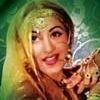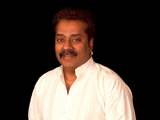Born in Bombay on April 3rd, 1955, Hariharan has bachelors degrees in science and law. The son of renowned Carnatic vocalists, the late Ananthasubramani ("H. A. S. Mani") from Trivandrum and Shrimati Alamelu, Hariharan naturally inherited his parents' musical talents. Mom was Hariharan's first guruji. From her he picked up Carnatic music skills.
Hariharan's parents were musically open-minded and the young Hariharan was encouraged to listen to Hindustani music. Later, in his teens, inspired by the songs of Mehdi Hassan, Hariharan developed a passion for ghazals and started training in Hindustani music from Padma Shri Ustad Ghulam Mustafa Khan. He used to put in nine hours of singing practice everyday. Hariharan's affinity for ghazals lies in the fact that ghazals offer, in his words, "immense scope for innovation". The committed Hariharan also put heart and soul into learning Urdu when he decided to become a ghazal singer. He has perfected his Urdu diction to such standards that even his audiences in Lucknow, the heartland of the language, have been wowed over.
In 1977 Hariharan bagged the top prize in the All-India Sur Singaar competition and was promptly signed on by the late music director Jaidev to sing for the Hindi film "Gaman". His ghazal "Ajeeb saane he mujh par qarar" in that movie became such a hit that it won Hariharan an Uttar Pradesh state award, and Hariharan's playback singing career began.
In his early years Hariharan did the concert circuit and also performed on TV. He sang for a number of TV serials, e.g., "Junoon". In addition, he cut several successful ghazal albums. He wrote the scores himself for most of these ghazal albums. One of Hariharan's first ghazal albums was "Abshaar-e-Ghazal" with Asha Bhosle, which scored Gold in sales. Another outstanding ghazal album was "Gulfam", which not only hit Double Platinum in sales but also fetched Hariharan the Diva Award for the Best Album of the Year in 1994. Meanwhile, Hariharan sang in a number of Hindi movies such as "Sahibaan", "Lamhe", "Raam Nagari", "Dard Ke Rishte", Zamana" and "Sindoor".
The Bombay-based Hariharan made his debut in the Tamil singing world in 1993 with the patriotic hit song "Thamizha thamizha" in "Roja" under the baton of A R Rehman. Two years later, Hariharan was adjudged "Best Male Playback Singer" in the Tamilnadu State Government Film Awards for 1995. It was teasing manner in which he sang "Konjanaal poru thalaivaa" (Aasai) that won Hariharan this honour. Subsequently, Tamil singing assignments began pouring in for Hariharan, and today there is no doubt that he is the most sought-after singer in South India.
The year 1996 was a milestone in Hariharan's career, when the release of the Indian-English fusion album "Colonial Cousins" skyrocketed him to unprecedented fame. A collaborative effort with Bombay-based composer/singer Leslie Lewis, "Colonial Cousins" became the first Indian act to be featured on MTV Unplugged and also won the pair a string of national and international awards, including the MTV Indian Viewers' Choice award and US Billboards award. In this album, Hariharan has proven his boundless virtuosity. He has also co-written the musical scores for some of the pieces. One very powerful song in the album is "Let me see the love", in which Hariharan scales through Hamsathwani raga in three octaves, hitting the lowest and highest notes with equal facility. Another interesting piece is "Feel Alright", in which Hariharan sings the English lyrics in typical Indian folk style, complete with gamaks. In "Rain" and "Tere mere aankhon", the ghazal singer comes to the fore subtly, while in "Krishna" and "It's gonna be alright", the Carnatic singer in Hariharan surfaces. The other songs in the album are equally melodious and showcase Hariharan's hitherto little-known versatility.
Another milestone year was 1998, when the patriotic song "Mere dushman mere bhai" from the Hindi movie "Border" won Hariharan the coveted National Award for "Best Male Playback Singer". That award capped a quest for excellence that started 20 years earlier when "Ajeeb saane he mujh par qarar" from "Gaman" won Hariharan a nomination for the National Award.
Hariharan has developed a distinctive style of his own even though he admires the late Mohd Rafi and Kishore Kumar as well as S P Balasubramaniam and K J Jesudas. The long-underrated singer has finally arrived and will remain a permanent fixture on the Indian musical scene for a long time to come.










comment:
p_commentcount